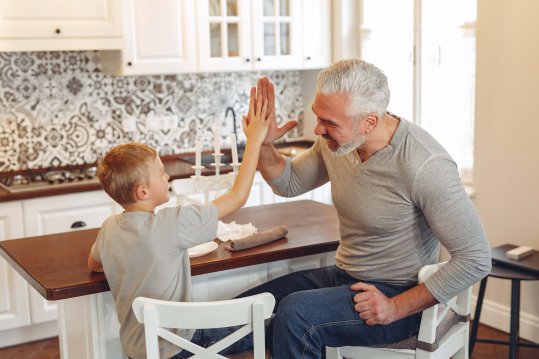Feeling joy not only gives us pleasure, but also has regenerating properties. When we laugh, we stimulate endorphins, i.e. the hormones of happiness. These, in turn, are responsible for our well-being and self-satisfaction. You could also say that this is our capital for the future. Experiencing joy opens access to other positive emotions and helps with being more optimistic and spontaneous.
Sources of joy
It’s worth celebrating and remembering what brings us joy. And how to cast your mind back to those moments? For example, by making a family poster under the slogan “Our sources of joy”. You’ll need small sheets of paper. Each household member draws or writes on them what they have enjoyed most recently. How many joyful memories do you have? The more, the better! Stick the finished works on a large sheet of paper or tape them together. Discuss what gives you the biggest joy and what makes you happy.
Focus on what you can do here and now. Larger trips, such as the one to the funfair, can be planned for later so that the idea doesn’t get banished. Hang the poster in a visible place to cheer you up every day and inspire you when choosing activities.
Laughter is the best medicine!
In addition to natural, spontaneous situations that make you laugh, you can plan a laughter training. Start with a warm-up in the form of movement exercises, e.g. stretching or breathing exercises to prepare the lungs. Even if it’s forced, laughter brings many benefits, and a self-conscious chuckle can turn into spontaneous laughter.
Let’s play!
In the situation which we find ourselves in, we’re experiencing various emotions caused by tension, stress and inability to work it off. Let’s try to find a way to enjoy being together, e.g. by playing together.
For children, toys are a secondary matter. What’s most important is the attention and interest that we offer them. Playing is not a job which needs to be done. It’s supposed to be a moment of respite, a break from everyday life, a trip to an alternative world. What is your task? Be close, assist, observe, listen, follow the child’s lead and make suggestions. Let the child experiment and fantasise. Let your own inner child take over.
Don’t be too competitive in games, but, despite the fact that children love to win, don’t give them head start. The older the child, the faster they will realise that something is wrong and they’ll fail to build their self-confidence. Such situations help the child get used to the fact that sometimes you win and sometimes you lose. Your job as a parent is to capture the feelings and emotions of your child and to name them rather than oppose them. Let the child be upset when they lose. In this way, children learn what they are experiencing, become aware of what is happening to them and know that they can cope with their emotions.


